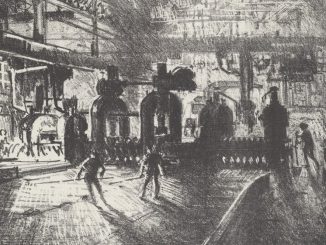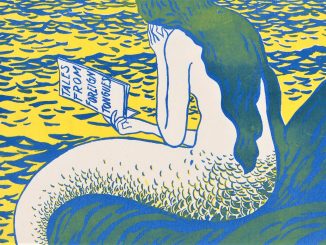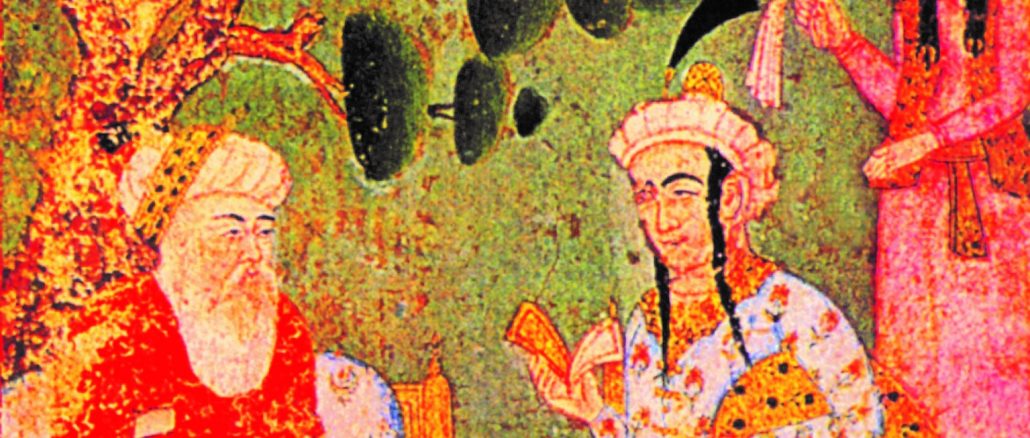
The interview focuses on world literature and the task of introducing Cultural Studies to China. This interview will also be published in Chinese in the China Book Review.
REBECCA RUTH GOULD is a writer, translator, and scholar whose books include Writers and Rebels: The Literatures of Insurgency in the Caucasus (Yale University Press, 2016), After Tomorrow the Days Disappear: Ghazals and Other Poems of Hasan Sijzi of Delhi (Northwestern University Press, 2016), and The Prose of the Mountains: Tales of the Caucasus (Central European University Press, 2015). She is currently Professor, Islamic World and Comparative Literature, at the University of Birmingham.
Liu Jun: Hello, Professor Gould. Thanks for accepting my interview request. My first question relates to the fact that you are an American professor and your research interest relate to the Islamic world and the Caucasus. Both are historical rivals of the U.S. So what motivated you to become involved in such fields of research?
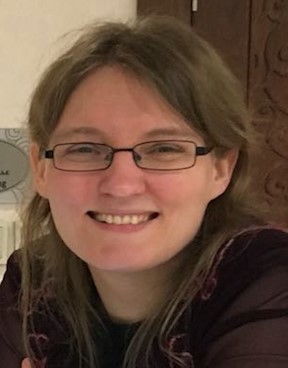
Rebecca Ruth Gould: Great question. It goes back to when I was an undergraduate at the University of California at Berkeley. Actually, it goes back to before that. When I was sixteen and I fell in love with world literature, and I decided I wanted to become a writer. The first writer who made a big impact on me was Dostoevsky. I read everything that Dostoevsky wrote, from the Brothers Karamazov to Demons to The House of the Dead. I also read Tolstoy’s War and Peace and Anna Karenina, but Dostoevsky made a bigger impact at the time (although in fairness I am more likely to read Dostoevsky now). I loved Dostoevsky’s writing so much that I decided to major in Russian, in order to immerse myself in his work completely.
While I was at Berkeley, I spent a summer of intensive language study in St. Petersburg, one of Russia’s most beautiful cities. I had the luck to stay in St. Petersburg during the White Nights, which was another subject of fascination to Dostoevsky, as reflected in his 1848 short story. It is generally believed that Russian literature is focused on Moscow and St. Petersburg and only deals with Russians. It is easy to understand why readers may draw that conclusion, given the way in which the Russian literary canon is taught, but that view is false. Russia—and Russian literature—contains many diverse voices non-European and non-Christian voices, particularly from Central Asia and the Caucasus, and particularly during the late tsarist and Soviet period. Even as I wrote my thesis on Russian religious philosophy in Dostoevsky’s Demons during my final year at Berkeley, I was coming to realize that I wanted to learn more about the Muslim peoples of the Caucasus rather than being restricted to the traditional Russian canon. I entered Berkeley right at the end of the First Russo-Chechen war began, and I graduated from the university during the first year of the Second Russo-Chechen war. Hence, my entire undergraduate study of Russian took place in the shadow of this war. Chechnya was frequently in the headlines, but there was little in the way of substantive coverage, and literally nothing from Chechen points of view. There were many negative media representations of Muslims and the only sources available, even for someone who was becoming a Russian specialist, were in Russian and from Russian orientalist perspectives.
I realized the Russian sources—particularly those which received mainstream exposure—didn’t tell the whole story, of the recent war, or of the history of the Caucasus. I wanted to become a scholar who could understand the experiences of the peoples of the Russian empire from a postcolonial point of view. I wanted to see all sides of the colonial encounter, not just the Russian one. So after I graduated from university, I traveled briefly around the Caucasus, including a trip to Grozny in 2004, when the city was entirely flattened by bombs and aerial raids. (I have written about my visit to this war zone in “Behind the Wall of the Caucasus: Crossing into Chechnya,” The Gettysburg Review, 2005). I then went back the following year, this time on a research grant funded by the State Department, through American Councils, to live in Tbilisi, the capital of the of Republic Georgia, in the South Caucasus. Living in Tbilisi, as I did for two years, changed my life forever. I embarked on the intensive study of Georgian, alongside Chechen (I made much more progress in the former language than in the latter). I traveled to the stunningly beautiful Pankisi Gorge, where I continued to study Chechen with my teacher, and to many other parts of Georgia. My first book-length translation, The Prose of the Mountains: Three Tales of the Caucasus (Central European University Press, 2015), three stories by the Georgian writer Alexandre Qazbegi, dates from a translation I first drafted while living in Tbilisi, studying Georgian. My first book Writers and Rebels: The Literature of Insurgency in the Caucasus (Yale University Press, 2016) is also heavily based on fieldwork I conducted during this period.
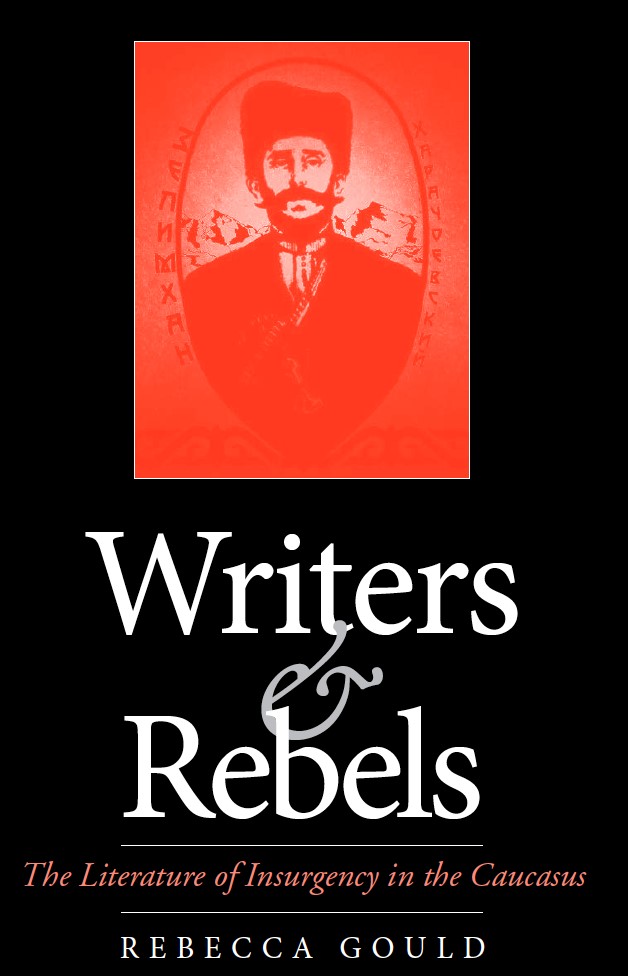
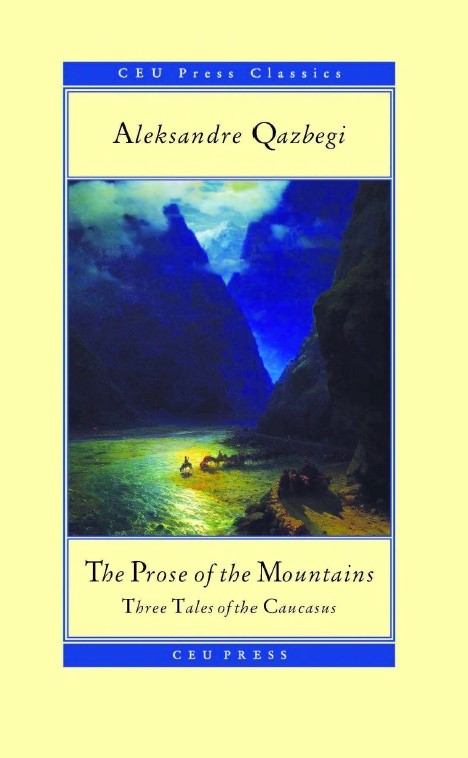
LJ: Your work in and on translation has given you a unique perspective on world literature. I have read your essay about the methods and tools of non-European poetics (“Telling the Story of Literature from Inside Out: The Methods and Tools of Non-European Poetics,” Comparative Studies of South Asia, Africa and the Middle East, 2018). In this essay, which is based on recent work about Sanskrit poetry (kavya) and its impact on South Asian literatures, you put forward three elements that can constitute a material foundation for the concept of world literature: multilingual literary cultures, the theorization of literary difference, and vernacularization. This article offers a provocative and wide-ranging method for engaging cross-culturally with literary form.
But have you considered the role of economic conditions in shaping the production of literature? You focus on the ideational and abstract dimensions of literature, but actual literary systems are comprised of many different factors. So how do you consider these three elements interacting with each other, the literary imaginations with the underlying politic and economic factors? What is the relationship among them?
RRG: Interesting question. I certainly don’t think that economic conditions are irrelevant to the study and production of literature. But I do believe in a universal experience of beauty, which of course also differs according to time and place. At a basic level, everyone can experience beauty, whether they’re rich, or poor, irrespective of their socio-economic situation. It is true that training and education—which are often available only to those born into wealthy families—can enhance one’s appreciation for literature. But I don’t think that appreciation of beauty, which is in a sense the defining aspect of literature, is limited to the ruling class. With that said, I do very much value political and sociological readings of literature, particularly those influenced by Marxism, and I believe that these approaches can help us understand literature in new ways.
It is also important to bear in mind that literature, like any aesthetic experience, challenges and transforms any given class and economic situation into another kind of experience. So while poverty, for example, may prevent us from accessing literary texts, once these texts are accessed, they have a special value that those who never had to struggle for the right to access them will always lack. Richard Wright’s autobiography illustrates the unique meaning that literary texts can have for those who were born into disadvantageous circumstances. I have in mind, in particular, Wright’s account of learning to read and then discovering Dostoevsky in Native Son (I have written about this in “Philology, Education, Democracy,” Journal of Aesthetic Education, 2012).
LJ: You value non-European points of view and you think that there is something called universal beauty. Because of your background and culture, you don’t want to be a Eurocentric theorist, but Eurocentrism is inevitable. When you engage with non-European cultures, such engagement is still part of a process of enriching your own culture, and of extending your own understanding. So I think Eurocentrism is a something that you oppose, but you can’t reject it entirely.
RRG: I see your point. The problem with Eurocentrism is not the focus on Europe but the restriction to a European point of view. I believe that it is possible to focus on Europe, and even to read texts from European perspectives, in European languages, and within European contexts, without being Eurocentric. The problem begins when you assume that Europe represents the entire world, as many current textbook and anthologies still encourage us to do, notwithstanding millennia of world literary history that could help us to place Europe in a global perspective, if only we made ourselves aware of these pasts. Contrary to what is implied when “language and literature” departments organize themselves into English, French, German, and Spanish, literature has always thrived on cross-cultural exchanges. Literature has never been purely national.
Another problem with the Eurocentric approach is that, in restricting readers to single cultures, it denies the importance of translation. Translation is a medium on which literature thrives. There are many texts that have a fuller life in translation than the original, such as the Sanskrit Ramayana and the Arabic A Thousand and One Nights. How can that be explained within the confines of a nation-based account of literature? On some matters, such as the nuances of words and technical details relating to the language of a text, the native reader has special insight and a privileged point of view, but sometimes the foreign reader also has special insight that the native reader cannot so easily access. For me the key is to understand not just the text, but to understand the theory that informs the text, that shapes the imagination of the reader as well as of the writer. Even more important than understanding European literary theory when we read non-European literary texts, is understanding the local aesthetic traditions within which the text was produced. I believe that if a reader becomes immersed in that, and learns that tradition, then she can come close to the privileged vantage point of the native reader, not reproduce a hundred percent, but still have a reading experience that is not entirely overdetermined by European norms and nothing else. I think one can always make progress in terms of understanding different cultures, notwithstanding the fact that many basic terms, in literature as well as in our daily lives, can never be perfectly translated.
LJ: I also think that translation is an important part of world literature. I know you can speak five languages and that you read many more. So I think you have a special ability to make progress in the field and your language abilities are an essential part of this.
Let’s talk about your book Writers and Rebels. This book is structured by a brilliant concept, which you call transgressive sanctity. Can you explain this concept briefly?
RRG: I understand transgressive sanctity as the process whereby a transgressive act that is normally seen as illegal or immoral is given high moral status. The act is sanctified by the unjust political regime, or rather by those who oppose it. Transgressive sanctity can only occur in a context of profound injustice, such as colonialism, or deep economic inequality. While political injustice does not cause transgressive sanctity, it is a precondition for it. So, for example, it’s immoral in many societies to rob someone to take their money. But if the person whom you have stolen from has killed your mother, raped your daughter, or, even more to the point, if he (or she) belongs to a class or people who regularly harm your family and neighbors, then the ethical implications of an unlawful act are transformed. Especially if by robbing that person you help to bring about your people’s liberation. So the relative ethics of certain kinds of acts is deeply affected by the legal system and the political regime under which people act. It is also relevant to know whether those who act unlawfully have autonomy, and whether they are oppressed. The point of transgressive sanctity is not to excuse criminality, but to better understand its internal dynamics, and also to understand why, in certain social and historical contexts, criminal acts receive popular support.
While living in the Caucasus and researching its literature and history, I discovered a tradition of banditry—encapsulated into the figure of the abrek, the local term for this kind of noble bandit—that conforms to this pattern. In fact, the tradition of noble (or social) banditry is a global one. A famous Chinese literary text draws to this tradition as well: Water Margin, a novel dating to the 14th century and attributed to Shi Nai’an (though his authorship is uncertain). Water Margin is about a group of outlaws who can be seen as the Chinese counterpart to Robin Hood. They gather at Mount Liang to resist the government until they are granted amnesty and start acting on behalf of the government.
Every culture has such a tradition. Many of these examples are discussed in Eric Hobsbawm’s famous books Primitive Rebels (1959) and Bandits (1969). Aside from a very brief reference to one specific abrek (named Zelimkhan), Hobsbawm does not mention that the Caucuses has an extended tradition of the outlaw bandit who is glorified by the community he supports. Before colonialism, when the Caucasus was not part of any empire (although it was still of course affected by imperial dynamics), the abrek who raided villages was treated with contempt. Anyone who perpetrated an act of violence on a neighboring village would be ostracized from their community. Russian rule radically changed this dynamic: it introduced a new kind of mobilization against the colonial order, and, ultimately, it popularized a new kind of criminality. With that said, the very notion of what was and was not a crime was transformed by the introduction of a new legal order. Instead of seeking to balance Islamic law against local customary law (called in Arabic ‘adat), the peoples of the Caucasus now also had to contend with colonial law (which in Russian is called zakon). As you might guess, zakon was not universally respected by the colonized peoples, and many regarded it as a foreign imposition. The violation of colonial law was for this reason favorably regarded by many Chechens and Daghestanis.
Writers and Rebels focuses on one particular abrek, Zelimkhan of Kharachoi. He died in 1913 when he was shot by a tsarist official, just a few years before the collapse of the Russian empire. When Zelimkhan raided Cossack villages, and conducted raids on Russian trains and carriages, he was celebrated by his fellow Chechens, who regarded him as an anti-colonial warrior. In Chechen folklore and subsequent Soviet literature (including novels by the Ossetian writer Dzakho Gatuev and the Chechen writer Magomed Mamakaev) Zelimkhan came to be depicted as a saintly, holy figure.
As I studied these materials, and particularly the stories about Zelimkhan, I became fascinated by the process through which the ethical transvaluation of criminal acts takes place. I became fascinated by how a transgressive act that would be seen as shameful in one context became sanctified in another. What social factors determine the difference between an act of anticolonial liberation and a crime? In many respects, it depends on who’s watching and who’s judging. Transgressive sanctity is a political and aesthetic theory that accounts for these variations.
LJ: These types of acts can be found in all parts of the world, including among the poor, where such acts are often connected to economic circumstances. The Chinese bandits in Water Margins fight for the poor, and that’s why they’re not seen as evil. Maybe they do bad things but they’re considered heroes because of what and who they’re fighting for.
Your book offers three examples of violent acts by abreks in Chechnya, in the Caucasus. These brutal actions take place in a time of revolution, during the anticolonial struggle of Caucasus peoples against the Russian empire. But there is also a contemporary dimension to your analysis, linked to the more recent war in Chechnya and surrounding regions, and associated with Islamic jihad. When you write about that you appear to be trying to make this violence seem reasonable, as if you have compassion with it. You try to represent their point of view, and to understand the position of those who engage in violence. I think that this type of logic may be dangerous. Do you agree?
RRG: I think it is always possible, especially for someone who believes in and who engages with literature, to identify with someone who does something evil. As humans, all of us have a capacity to do evil, as much as we have the capacity to do good. Equally, it is possible through literature to see the world from the perspective of people who are different from us, including criminals, and people we disagree with. Seeing the world from their point of view doesn’t mean celebrating their acts, and it is entirely consistent with condemning evil. Being able to see in this way—to understand why people become criminals even as we condemn their acts—is necessary for our survival as a species. If we don’t engage in such acts of empathy, then we’re denying the power of literature.
Dostoevsky is one of my favorite writers. He believed that the difference between a murderer and a saint was minuscule. This is why the characters in Dostoevsky’s novels tend to engage in such intense dialogue with each other. Among the most powerful scenes in Demons is the dialogue between the saint Tikhon and the rapist Stavrogin. Of course, I don’t support Stavrogin as a reader. But I think it’s very important—and indeed educational—for readers to witness how Stavrogin and Tikhon engage each other. They develop a relationship of what can only be called intimacy, intellectual intimacy, like a deep kind of friendship. All too often, those in power dismiss groups, peoples, and entire communities on the basis of their perceived criminality, without inquiring into other social factors, including the income inequalities these rulers produce and the limited opportunities for social mobility that extreme poverty fosters.
In order to seriously challenge evil, we should be focusing less on our internal dispositions and more on what makes evil acts seem like the only option. Such factors include income inequality, limited social opportunities, and oppression. To the extent that we can contribute to the eradication of these forms of injustice, we will have made the world a better place.
In the process of trying to bring about justice, it is never harmful to try to understand the position of those who commit evil acts. A saint should be able to sympathize with a criminal (as Dostoevsky has shown), just as criminals can only gain by sympathizing with saints. That doesn’t mean accepting or applauding crimes. So, as for terrorism, I don’t think that we lose anything by trying to understand terrorist acts from the perspective of the perpetrators. I don’t see an ethical problem with trying to understand why someone would kill themselves, for example, or glorify the killing of others. The reason is that I think we all have the capacity to perform such acts, so it is better to understand why some people do them and some do not, than to criminalize entire populations due to the evil actions of some members of a group.
We also should not be afraid of understanding the perspective of those who commit acts of violence, because it is always possible to argue against these acts, to contest them with reason, and by appealing to justice. In terms of the Chechen example, I definitely agree that much Chechen resistance to Russian rule during the First and especially the Second Russo-Chechen War was counter-productive. Chechen rebels lost the war and caused much avoidable suffering. On the other hand, what else could they have done? The international community abandoned Chechens in their time of need. And unfortunately, the conflict was never resolved. No one knows what the future holds, most like more violence.
So I don’t support every act of resistance. Often, resistance simply results in defeat and in the loss of innocent lives. I do, however, support trying to understand why people resist, through whatever means, however violent, and trying to work through those motivations in the hopes of bringing about a more just social order. In the case of anticolonial resistance particularly, I believe that literature can be tremendously helpful to this task. For the Caucasus, in order to understand these perspectives, I recommend reading the writing of Magomed Mamakaev (whose work I discuss in my book). Frantz Fanon offers similar insights for Martinique and Algeria, in books such as The Wretched of the Earth and Towards an African Revolution.
LJ: Another very interesting part of your book is your interdisciplinary method. You tend to avoid state-centered narratives and instead seek to develop an account of the past based on literary and ethnographic texts. What factors do you take into account when engaging in this kind of research? And what do you think is its significance for literary history and for history in general?
RRG: Great question. I am deeply interested in the past, like most historians, but I am also deeply frustrated with the historical methods that dominate the discipline today. This is why, although my work is very interdisciplinary, and I have often considered myself an anthropologist as well as a literary critic, and I have been tempted to identify with other disciplines as well, I have never been tempted to identify myself as an historian. The problem with the historical method—and in this respect I think it is fair to claim that there is only one viable method today—is that from the nineteenth century onwards there has been a tendency to fetishize historicism as a precondition for legitimate scholarly inquiry. This applies even to scholars of literature, unfortunately.
By “historicism” I mean that the Rankean understanding of historical objectivity has become so normative that we have lost any faith in the alternatives. Any form of inquiry that is not historicist is generally regarded as unscholarly, and indeed “ahistorical” is a term of opprobrium for most academics. As a result of these constraints places on our conceptual horizon, we have lost faith in the contribution that the literary imagination makes to our understanding of the past.
I have been inspired by many historians, in particular Arnaldo Momigliano, to whom I dedicated an essay entitled “Antiquarianism as Genealogy: Arnaldo Momigliano’s Method,” (History & Theory, 2014). I have also been inspired by historically-minded philosophers such as Giambattista Vico, whom I wrote about in “Democracy and the Vernacular Imagination in Vico’s Plebian Philology” (History of Humanities, 2018). Although Vico and particularly Momigliano were not necessarily identical to me in temperament, their work serves as a perennial source of inspiration and as a model for the type of work I aim to produce.
Another thinker whose work serves as a touchstone for my own approach to literature and history is Walter Benjamin. Benjamin’s thinking shapes just about everything I write and think. Though I have not yet written an essay dedicated to him exclusively, I have penned some preliminary personal reflections in “Packing My Library: Benjaminian Fragments of a Peripatetic Life” (Kenyon Review Online, 2013). Many of my essays deal with various aspects of Benjamin’s thought, in particular his work on translation theory, but his thinking on the relation between literature and history also resonates deeply with me. I also wonder sometimes about the increasing similarities between the era in which Benjamin lived and our own. Not that we have yet come to the brink of fascism, but surely like Benjamin (who killed himself in 1940 rather than being taken by the Nazis) we too inhabit a state of emergency, with the seemingly endless war on terror, and the large-scale global human rights violations that this so-called war has legitimated, including, in particular, by the country of my birth.
Getting back to the more literary dimension of the relationship between literature and history, I am often reminded of Proust’s statement in his In Quest of Lost Time that “perpetual error is precisely life itself.” This statement can be read as a concise justification of the scholar’s literary method, for in selecting facts deliberately and in choosing to ignore certain details while dwelling on others, anyone who writes about the past is engaged in the art of literary creation.
We may not always be able to see the big picture with complete objectivity. But sometimes our limited vision provides unique insight that other ways of seeing obscure. Let’s say you see someone on the street and she looks like your mother. When you see her, you do not see her objectively. Instead, you see her in relation to yourself, to your personal life, and to your personal history. There is inevitably something false about such selectivity, and it may have very little to do with the person whom you see. Yet, there is also something about this angle of vision that is profoundly true, true in a way that a more objective way of seeing might miss. Stated in another way, there is a value to certain kinds of biases. Literature teaches us to distinguish between the biases that are useful and the biases that we should overcome. To return to your original question, I felt while working on Writers and Rebels that purely archival and state-based history could never produce the kind of story that I wanted to tell or help me answer the questions that were driving my research. In particular, history told from the perspective of the state, and based primarily on the writings and archival records of state officials, could never have helped me to understand transgressive sanctity. For insights into that dynamic, it was necessary to look to folklore, literature, and ethnography.
LJ: You’re a professor from the US now based in the UK at Birmingham University. From 1964-2002, the Centre for Contemporary Cultural Studies (CCCS) was based at Birmingham. It had a big influence on the development of Cultural Studies in the United States. In China, CCCS also have a huge influence. Back in the 1980s, literature scholarship was popular and widespread in China. When CCCS methods were introduced to China, most literature critics became cultural critics and started conducting research on contemporary culture, such as film and especially popular culture. Does the CCCS approach, especially cultural critics such as Stuart Hall, influence your research?
RRG: CCCS is also associated with the emergence of postcolonial theory, as well as with leftist multicultural thought generally, within the UK. Stuart Hall founded New Left Review, which is an influential monthly magazine for me and many other leftist intellectuals. For me, the postcolonial angle is more interesting than Cultural Studies in itself. I have looked at some of the materials archived by the Contemporary Cultural Studies project of the University of Birmingham, such as CCCS publications and yearly reports, and on the basis of that it seems to me that one limitation to CCCS as it was practiced at Birmingham is its exclusive focus on Britain. Of course, that doesn’t mean that their method cannot be revived today, from a more global perspective, just that I tend to be curious about the world beyond Britain, and the CCCS focus on British culture is not the path I would have taken. But in more general methodological terms the CCCS approach is surely an inspiration. It would be fascinating to see what could be done with the cultural studies approach pioneered by CCCS from a multilingual and non-UK-centric angle.
LJ: Culture Studies in Britain today is divided into two strands. The first strand is Cultural Studies, dating back to CCCS. The second strand is Culture Materialism. I think your book Writers and Rebels could be included in this second part, given its tendency to situate literature in a wide social and political context. Do you agree?
RRG: That’s absolutely true. I very much believe in the autonomy of literary form—particularly poetry—but, unlike many scholars who are happy to study literature in isolation without understanding how it actually works outside the academy and why literary texts matters to non-academics, I feel the need to read texts in a worldly manner. If a literary text does not make a difference to someone somewhere, even if only to the writer or to a single reader—and one person is enough—then it can hardly be said to exist.
When I read a book, I want to know how other people are reading it. I want to know how it’s being read throughout history and in other times and places. When one looks at the reception of texts—at their afterlives, which can often be traced to the oddest and most unexpected of places, that’s when the power of literature becomes most evident. I also believe that scholars should always try to read texts from perspectives outside the academy. I have called this reading practice “vested reading” (“Vested Reading: Writing the Self through Ethan Frome,” Life Writing, 2016). By “vested” I refer to personal investment, the sense of being personally connected to a text. So this concept refers to the distinction between reading something in a highly personal, subjective manner, as if it were written for you the reader, rather than objectively, from an historical distance. It also involves what some may call misreading, but which I would call vested/personalized reading, because I consider it legitimate. Often people watch movies in this way, but not so often books. Teaching classics to college freshman (as I did at Columbia University and later in Singapore) is a great way of being exposed to ways of reading literary texts in ways that scholarship does not anticipate.
Methodologically, reception theory has always been fascinating for me. I am a disciple of Gadamer, as well as of Jauss, and I aspire someday to connect their insights, inspired by their interpretation of European literature, to my experience of engaging with the literatures (and legal texts) of the Islamic world.
LJ: So the last question, have you ever been to China? What have you read about China? Do you have any views on contemporary Chinese culture that you would like to share?
RRG: Last year, I briefly visited Ningbo in eastern China and I was impressed. It was a very well-ordered city, similar to Sweden or another Scandinavian country, very safe, clean, and quiet. I have only read about Shanghai, in Kazuo Ishiguro’s novel When We Were Orphans. I’ve never visited. I would love to visit Shanghai and Beijing. Among Chinese authors, my favorite is the modernist short story writer Lu Xun, whom I discovered (thanks to my friend Petrus Liu) while I was teaching at Yale-NUS College in Singapore. I have been impressed by Lu Xun’s writings about translation, which I discuss in my article “Hard Translation: Persian Poetry and Post-National Literary Form” (Forum for Modern Language Studies, 2018).
I have also been deeply moved by Lu Xun’s short stories, in particular one called “Sadness,” about a couple who gets married when they are very young and deeply in love. Their marriage grows sour and they have a difficult life due to poverty and estrangement from their family. It is one of the best short stories I’ve ever read and very sad.
In terms of requests to pass on to Chinese readers of this interview, I would like to ask for more translations of texts from across the full range of Chinese literature, and of Chinese literature in minority languages. Somewhat similarly to the Russian empire, China is a country with many different peoples, from various ethnic backgrounds and religions. I would like to see this diversity more fully reflected in the Chinese literature available in English translation. It would be great to have access to the voices outside the mainstream, on the margins of the empire (historically understood) and far away from imperial centers of power. And what about Chinese literature written from outside China, in Korea for example? Or Vietnam? Or the US? And what about Chinese Muslims? I am sure that there is a rich literary history within all these traditions that awaits translation into English. So please translate more of these marginalized voices into English.
Finally, this reminds me of an entirely different aspect of Chinese literature that I had the pleasure to learn a bit about classical while teaching in Singapore. I mean classical Chinese literary theory, and in particular The Book of Songs. We taught the preface to the Book of Songs to the incoming students of Yale-NUS. The students loved it. Many of the students from China had already studied this text in high school. They had even read some of the medieval commentaries on this work. I was very impressed with their expertise.
Partly inspired by this experience, my essay “The Much-Maligned Panegyric: Toward a Political Poetics of Premodern Literary Form,” (Comparative Literature Studies, 2015) compares Persian, South Asian, and East Asian panegyric genres. My research for this article introduced me to the Chinese fu, a genre that obviously has its own complex literary history, but which also merits comparison with other odes in world literature, including in particular the Islamic qasida. The preface to the Chinese Book of Songs reminded me a great deal of similar texts in Persian poetics, in particular the Four Discourses by Nizami Aruzi, from the 12th century. It seems to me that classical Persian literary critics share in common with classical Chinese literary critics a similar understanding of poetic inspiration, although of course there are also differences. I noted that in the Chinese preface there was a particular interest in the relationship between poetry and music.
LJ: The Book of Songs is indeed about poetry as a kind of dancing, not just music. Yes, it’s very inspiring. It is in part about how elegance can be put to the service of the government. And also how it can enhance our enjoyment. To this day, this text remains quite influential within China.

REBECCA RUTH GOULD is a left-leaning intellectual who cares about free speech, peace, global equality, gender, social, and racial justice, and a range of issues related to Muslims. To read her political commentary, go here. Find her scholarly articles here.
Get your copy of critically-acclaimed Writers and Rebels: The Literatures of Insurgency in the Caucasus (Yale University Press, 2016) on Amazon, or read selections from the book here. Writers and Rebels has received the following honors:
- Winner, University of Southern California Book Prize in Literary and Cultural Studies
- Winner, Best Book by a Woman, Association for Women in Slavic Studies
- Honorable Mention, Joseph Rothschild Prize in Nationalism and Ethnic Studies, Association for the Study of Nationalities
- Honorable Mention, Davis Center Book Prize, Harvard University’s Davis Center
- Shortlisted, Central Eurasian Studies Society Book Award (History and Humanities)
Go here to preorder a copy of Gould’s forthcoming book High Tide of the Eyes: Poems (Farsi/English), by Bijan Elahi, translated by Rebecca Ruth Gould and Kayvan Tahmasebian, out in 2019.
You can follow her on Twitter, Medium, Academia.edu, and her personal website.
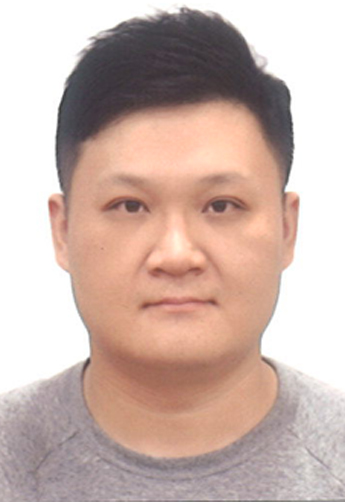
LIU JUN is a Ph.D. candidate in Literary Theory at Nankai University in the People’s Republic of China. His research interests include Marxism, Cultural Studies, and Gender Studies. He is currently researching the Indian Marxist Aijaz Ahmad’s critique of the European new left, and the legacy of the Birmingham School of British Cultural Studies after its closure in 2002.
Featured image: Book cover, After Tomorrow the Days Disappear: Ghazals and Other Poems (Northwestern World Classics, 2016), by Hasan Sijzi, translated from the Persian by Rebecca Ruth Gould.

